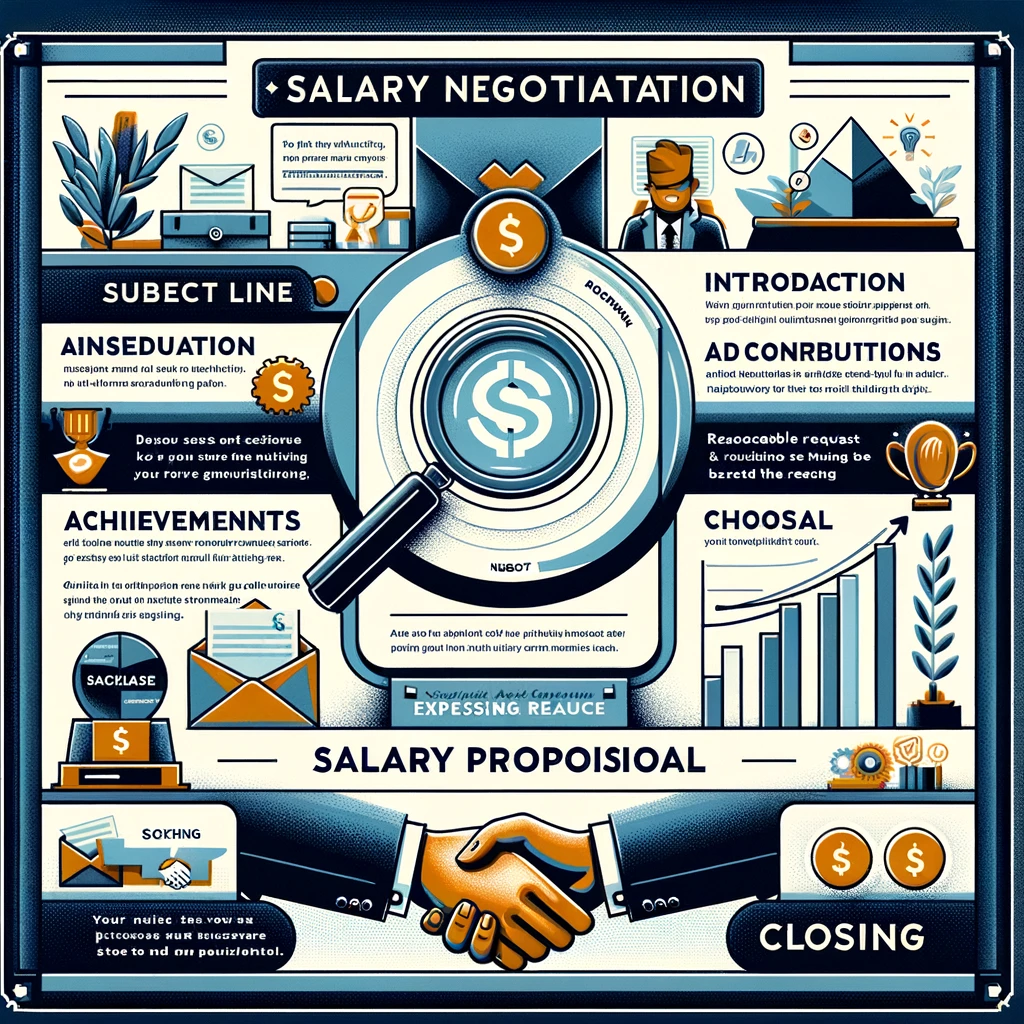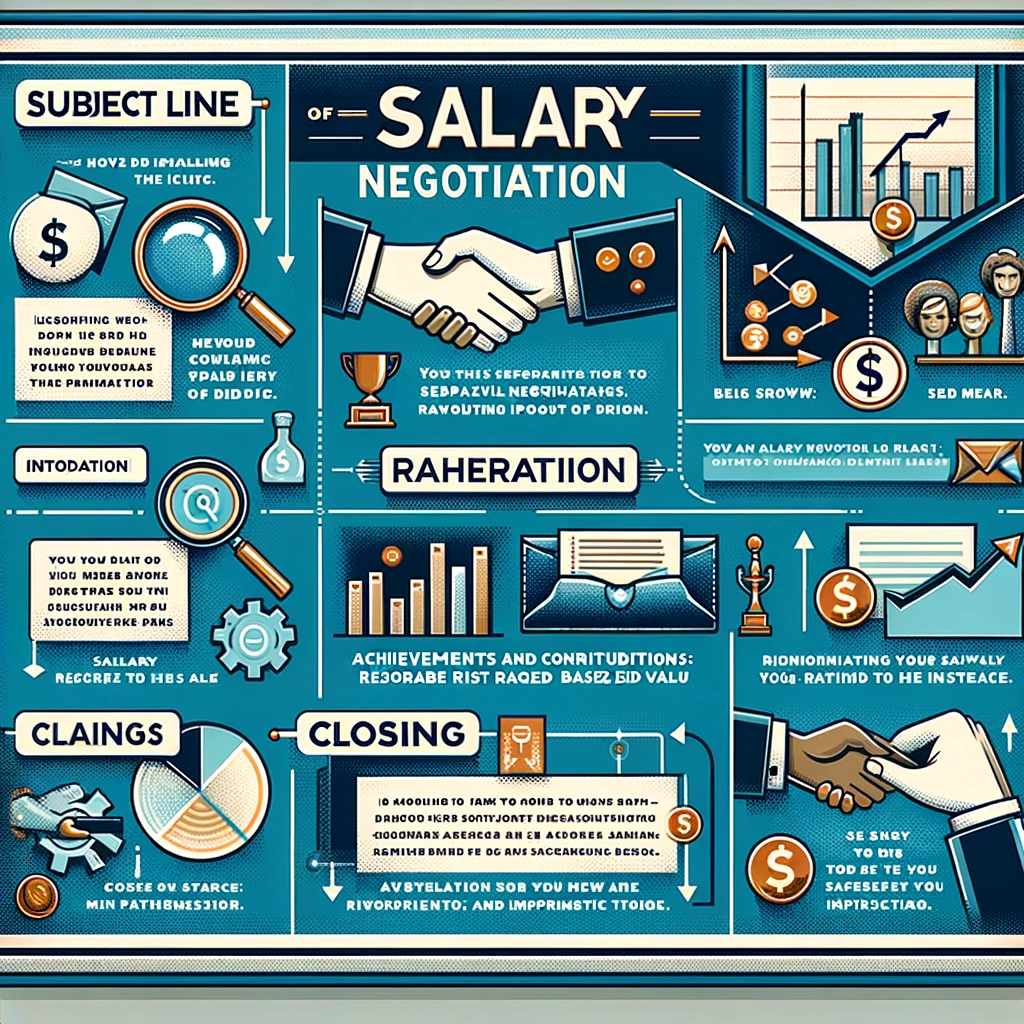Mastering the Art of Salary Negotiation via Email: Essential Tips and Strategies
Discover effective strategies for salary negotiation through email. Learn how to craft a persuasive and professional Salary Negotiation Email that can help you secure the pay you deserve.
Table of Contents
Introduction
Understanding the Importance of Salary Negotiation is a crucial aspect of your career journey. It’s not just about getting what you deserve, but also about understanding your worth in the professional world. Salary Negotiation Email has become a key tool in this process, offering a blend of formality and convenience.

Overview of Email Communication in Professional Settings
Salary Negotiation Email communication in professional settings demands clarity, politeness, and effectiveness. It’s a balancing act between being assertive and respectful.
Preparing for Salary Negotiation
Researching Industry Standards
Before you draft your Salary Negotiation Email, research is key. Understand the standard salary range for your role in your industry and location.
Assessing Your Value
Reflect on your skills, experience, and unique contributions. This self-assessment will guide you in making a reasonable request.
Crafting Your Salary Negotiation Email
Subject Line: The First Impression
Your subject line should be clear and direct, indicating the purpose of your email without being overly aggressive.
Opening Lines: Setting the Tone
Start with a polite and professional greeting. Express your enthusiasm for the role and the company.
Key Components of an Effective Salary Negotiation Email
Expressing Gratitude
Always begin by expressing gratitude for the job offer in a Salary Negotiation Email. This sets a positive tone for the rest of the email.

Clearly Stating Your Request
Be clear about your salary expectations. Ambiguity can lead to misunderstandings.
Justifying Your Salary Request
Highlighting Your Skills and Achievements -Use specific examples of your achievements to justify your salary request. This shows your value to the company.
Aligning with Industry Standards– Refer to your research on industry standards to back up your request. This demonstrates that your expectations are reasonable.
The Art of Persuasion in Salary Negotiation Email
Emotional Intelligence in Writing– Use language that shows understanding and respect for the employer’s position. This helps in building a rapport.
Balancing Firmness and Flexibility -Show that you are open to negotiation. This indicates that you are reasonable and willing to find a middle ground.
Avoiding Common Mistakes
Being Too Aggressive or Passive– Find a balance in your tone. Avoid being too demanding or too timid.
Lack of Clarity or Too Much Information– Be concise and clear. Overloading your Salary Negotiation Email with unnecessary details can be counterproductive.
Following Up After Sending Your Email
Timing Your Follow-up Wait for a reasonable period before following up. This shows patience and respect for the employer’s time.
Maintaining Professionalism Keep your follow-up email professional and courteous, regardless of how much time has passed.
Negotiating Beyond Salary
Benefits and Perks– Consider negotiating for benefits and perks if the salary offer is non-negotiable.
Work-Life Balance Considerations– Sometimes, non-monetary benefits like flexible working hours can be just as valuable as a higher salary.

Understanding the Employer’s Perspective
Budget Constraints– Be aware that companies have budget constraints. Understanding this can help you set realistic expectations.
Company Policies– Familiarize yourself with the company’s salary policies. This knowledge can guide your negotiation strategy.
Handling Rejection or Counteroffers
Staying Positive– If your request is rejected, stay positive. Ask for feedback and consider your next steps carefully.
Negotiating Alternatives– If a salary increase is not possible, negotiate for other benefits or perks.
Legal Considerations in Salary Negotiation Email
Understanding Your Rights– Know your legal rights regarding salary negotiation. This ensures that you don’t fall victim to unfair practices.
Navigating Legal Boundaries– Be aware of the legal boundaries in your negotiation. Avoid making requests that could be seen as unreasonable or illegal.
Leveraging Other Job Offers
When and How to Mention Other Offers– Mentioning other job offers can be a powerful tool, but it must be done tactfully and honestly.
Ethical Considerations– Ensure that your approach in leveraging other offers is ethical. Avoid using deceitful tactics.
Tips for Remote or International Salary Negotiations
Understanding Different Cultural Norms– In international Salary Negotiation Email, be mindful of cultural differences in communication and negotiation styles.
Adjusting Your Approach Accordingly– Tailor your approach based on the cultural norms and expectations of the company you are negotiating with.
Conclusion
Negotiating your salary via email requires a blend of research, self-awareness, and strategic communication. Remember, it’s about finding a mutually beneficial agreement while maintaining a professional relationship.
FAQs
- What to do if there is no response to the Salary Negotiation Email? Wait for a reasonable period, then send a polite follow-up. If there’s still no response, consider reaching out via phone or preparing to explore other options.
- How to negotiate salary in a highly competitive field? Focus on what sets you apart in your field. Highlight unique skills or experiences that give you an edge.
- Is it appropriate to discuss salary negotiation in an interview? It’s usually best to wait until a job offer is made before negotiating salary. However, if the interviewer brings it up, be prepared to discuss it.
- How to handle salary negotiation as a fresher? As a fresher, focus on your potential, academic achievements, internships, and any relevant skills that can add value to the company.
- Can you negotiate salary via phone instead of email? Yes, phone negotiations are possible, but email provides a written record of your discussions and agreements, which can be beneficial.

Salary Negotiation Email Template
Below is a template for a salary negotiation email. Remember to customize it to fit your specific situation and the job you’re negotiating for.
Template -1
Subject: Appreciation for the Offer and Salary Discussion
Dear [Hiring Manager’s Name],
I hope this message finds you well. I am writing to express my sincere gratitude for offering me the position of [Job Title] with [Company Name]. I am enthusiastic about the opportunity to work with such a talented team and contribute to the innovative projects that [Company Name] is known for.
After careful consideration, I would like to discuss the starting salary that was offered. While I am excited about the role and confident that I can bring a great deal of value to the team, I have some concerns regarding the initial salary offer.
Based on my research and understanding of the market standards in our industry, as well as taking into account my [specific skills/experience/qualifications], I was anticipating a salary in the range of [Your Expected Salary Range]. This range is more aligned with the industry standards for the role and responsibilities of a [Job Title], as well as the cost of living in [Location].
I believe that my [mention any special skills, experiences, or qualifications you have] will not only be a great fit for this role but also add significant value to the team and [Company Name] as a whole. [You can add a specific example of how your skills or experience will benefit the company].
I am very enthusiastic about the possibility of joining [Company Name] and am confident that I can make meaningful contributions to the team. I am open to discussing this further and finding a mutually agreeable solution.
Thank you very much for considering my request. I am looking forward to the possibility of working together and am excited about the contributions I can make to [Company Name].
Warm regards,
[Your Name]
Template -2
Subject: Discussion on Compensation Package for [Job Title] Position
Dear [Hiring Manager’s Name],
I hope this message finds you well. I would like to express my sincere gratitude for offering me the position of [Job Title] with [Company Name]. I am very excited about the opportunity to work with such a dynamic team and contribute to innovative projects that drive the company forward.
After careful consideration and research into the industry standards, I believe that a discussion regarding the compensation package would be beneficial. While I am enthusiastic about the role and confident in the value I can bring to [Company Name], I was anticipating a slightly different compensation package based on my [specific qualifications, skills, or experiences that relate to the job].
I understand the initial offer is [Mention the Offered Amount], and I greatly appreciate the company’s valuation of my skill set. However, considering my [years of experience/expertise in a specific area of IT/any relevant certifications or achievements], and the standard market rates for similar roles in [Your Location or Industry], I was expecting a base salary in the range of [Your Expected Salary Range].
I am confident that my [mention a couple of key skills or experiences relevant to the job] will not only meet but exceed the expectations for the [Job Title] role, contributing significantly to the team and the company’s goals.
I am very much looking forward to the possibility of working together and am open to further discussions about how we can align on this aspect. I am also willing to consider other compensation factors, such as bonuses, additional benefits, or flexible work arrangements, should there be constraints on the base salary.
Thank you very much for considering my request. I am eager to find a mutually agreeable solution and am hopeful for a positive continuation of our discussions.
Looking forward to hearing from you soon.
Warm regards,
[Your Name]
Follow the page and check out the channel for more such content.


